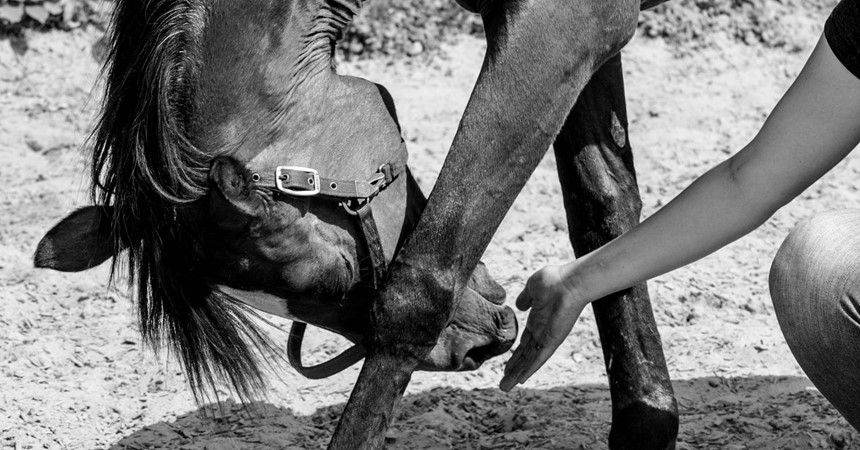"Horses live in a constant state of hypervigilance but have learned to live symbiotically with that experience and react only when the situation requires them to do so," she said.
"Put simply; horses live in the moment."
Similarly, those who have post-traumatic stress disorder (PTSD) experience hypervigilance in day-to-day situations. Rudimentary tasks such as going to a shopping centre or catching public transport can be wrought by severe stress and anxiety.
For Freddy Holten, a survivor of clerical child sexual abuse, these feelings are all-too-familiar.
"I have suffered flashbacks and memories since the age of 17," Mr Holten, now aged 46, recounts.
"I sort of understood what they were from, but two years ago, I had a serious breakdown and that's when I disclosed the abuse that occurred when I was age 12-13."
Since publicly disclosing his experience in 2019, Freddy has participated in numerous forms of therapy, including cognitive behaviour therapy (CBT) and dialectal behaviour therapy (DBT).
"The skills that I learned in standard psychology were ones I have been able to use during my day-to-day activities, especially in dealing with PTSD and its effects."
Through a desire to try something less clinical, Mr Holten signed up for his first round of equine-assisted therapy (EAT).
"It's very different to standard psychology, but the two complement each other," he said. "I've found it to be more engaging and less clinical."
"What attracted me to equine therapy is that it brings you into the present moment – you're so focused during the session that there's no opportunity to worry about the past or the future.”
Though nervous to begin his first session, Mr Holten said the feeling quickly faded once he felt a connection with his horse.
"I felt very grounded. It provided a sense of hope for my situation in life, which had been missing."
After his own positive experience of EAT* Mr Holten felt that it would be good if other survivors could have such an opportunity. He then decided to apply for a round of sessions through the Bishop's Healing Fund.
As a survivor supported by Zimmerman Services, Mr Holten first took the proposal to his caseworker, Michelle Zarb, who helped him through the application process. The proposal was accepted, and subsequently 10 people took part in group therapy sessions based out of Equine Encounters Australia in Martins Creek.
Mr Holten said that when he was first referred to Zimmerman in 2019 he was hesitant to trust the service but soon found the agency's intentions align with its stated aim of promoting healing and support.
"My perception of what they were like and what they are actually like is very different," he said. "At no time have I thought that my care has been compromised. I think the fact that Zimmerman Service works at arm's length from the Diocese is really important for people to understand."
Michelle Zarb, a caseworker at Zimmerman Service who provides support to Mr Holten, said the agency aspires to walk along the healing journey with the people with whom they work.
"Their wants and needs absolutely drive it," Ms Zarb said.
Mr Holten explains he feels that it's vital that survivors have choices.
"One thing I've found from being a survivor is that there's a lot of choices that are taken away from you. For example, you don't have the choice of when you're going to have a flashback.
"You go through so much hardship, so to have an opportunity to do something that positively affects you and those around you, and not to have to jump through a dozen hoops, is very important."
Following his experience with EAT, along with several other forms of complementary healing therapies, Mr Holten admits the last six months or so have seen a greater sense of hope return to his life.
"I'm still working through things," he said, "but things like helping to create these equine therapy opportunities for other survivors have led me to feel like there is some good that has come from my disclosure."
"I was at a point in life where I could either ask for help or I wouldn't survive.”
*Mr Holten’s experiences of equine assisted therapy (EAT) published in this article reflect his personal involvement. While Mr Holten’s application for funding for EAT sessions was assessed by the Standing Committee for Healing & Support and approved by the Diocesan Safety & Child Protection Council, the Diocese did not, and does not, guarantee individual results for EAT or any other type of therapy, as outcomes and experiences are unique to each person. A 2019 study published in the Australian Journal of Psychology concluded that the current evidence base has significant methodological limitations to the extent that no support for the use of equineassisted interventions can be espoused.
The Bishop’s Healing Fund is an annual budgetary allocation by the Bishop of Maitland- Newcastle of up to $25,000 to assist in promoting the healing of those affected by child sexual abuse in the Diocese of Maitland‑Newcastle.
The Healing Fund’s target groups are those affected by child sexual abuse perpetrated by Church personnel in this Diocese and those residing in this Diocese who have been affected by child sexual abuse perpetrated by a member of a religious order in another diocese. Applications may be made by individuals who were victims of abuse or the close relative or supporter/friend of individuals who were victims of abuse.
The activities eligible for funding include, but are not limited to, workshops, presentations, events or other projects or initiatives designed to promote healing or wellness amongst those affected by abuse.
To learn more about the Bishop’s Healing Fund or to make an application visit www.officeofsafeguarding.org.au




























































































